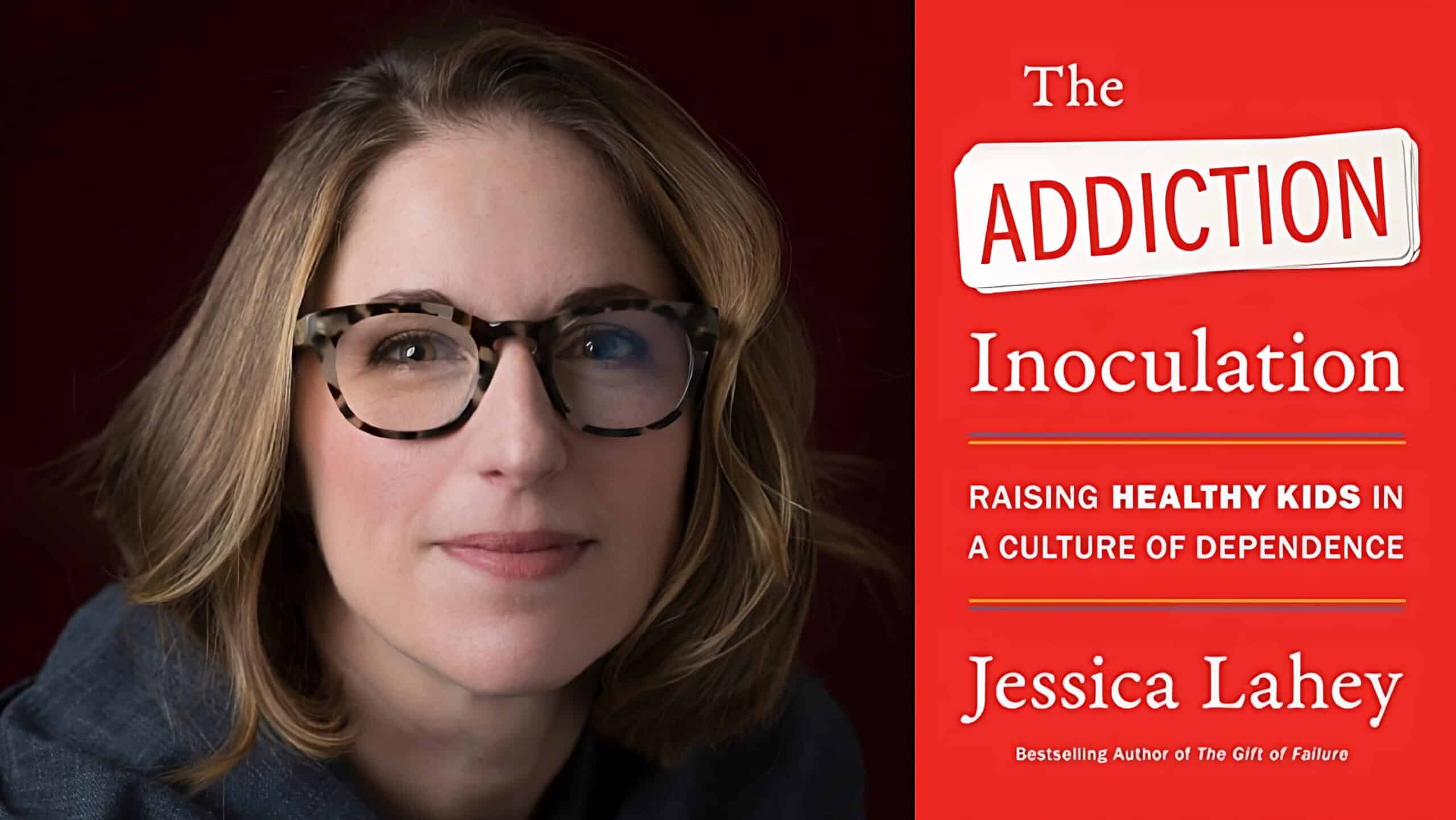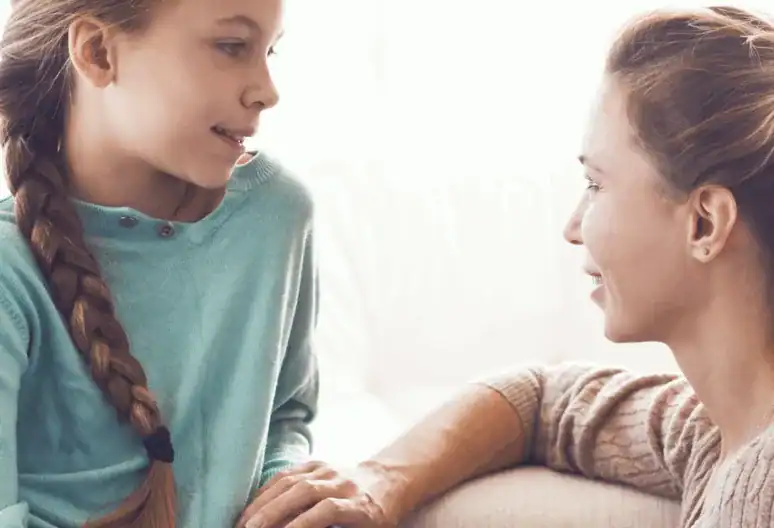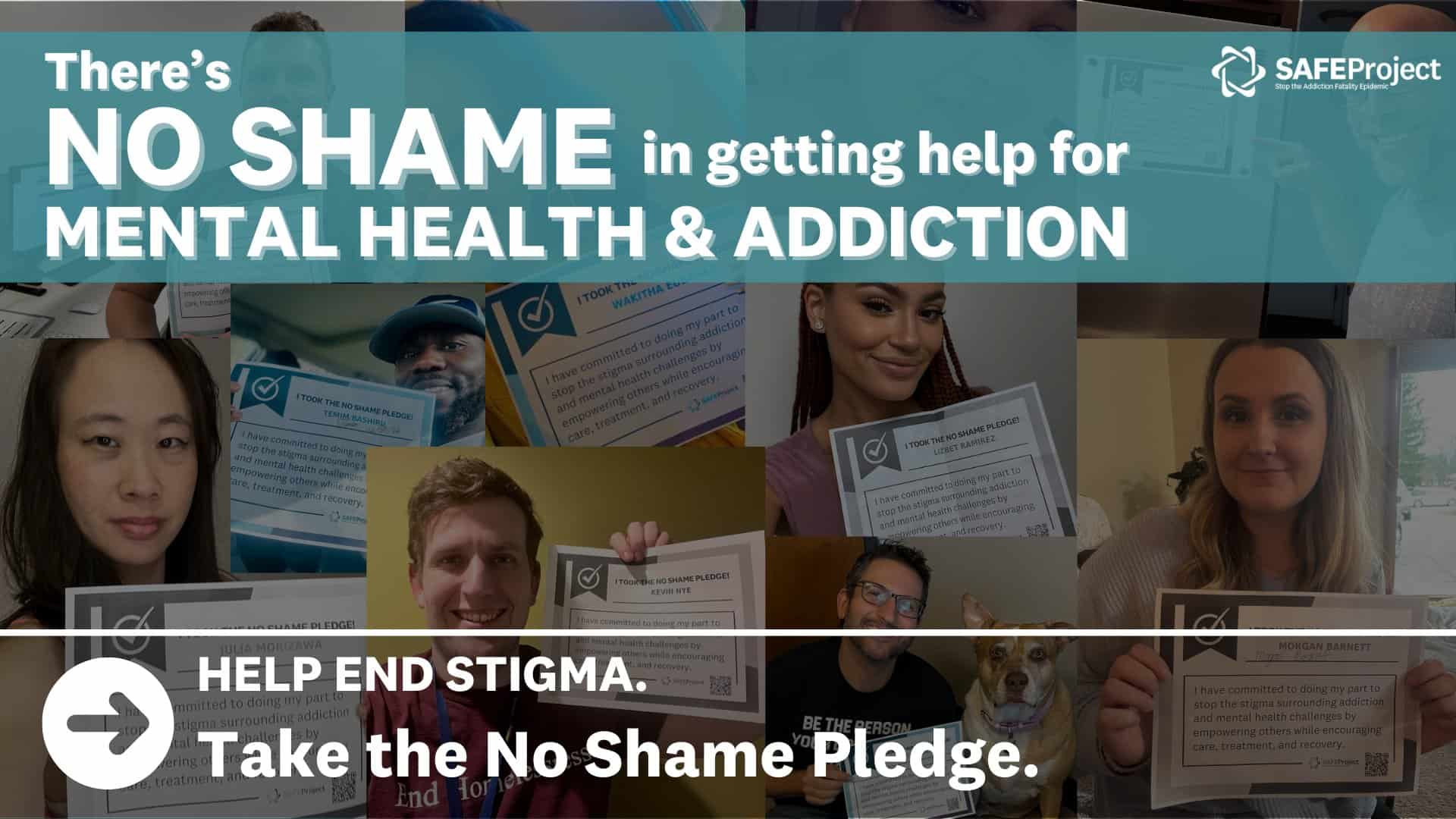To kick off Children’s Authors and Illustrations Week 2023, we are starting things off with a resource for parents! Our first interview is with Jessica Lahey, author of The Addiction Inoculation, a book that, “helps parents and educators understand the roots of substance abuse and identify who is most at risk for addiction, and offers practical steps for prevention.”

Jessica was kind enough to sit down with SAFE Project to discuss her research, her recommendations and advice for parents, as well as her own recovery journey.
Jessica’s Story and Research Process
Tell us a little bit about yourself.
My name is Jess Lahey, and I’ve done a lot of really cool things, but predominantly I was a teacher for 20 years, taught every grade from six to twelve, and have written a couple of books. The Gift of Failure, very fortunately for me, was a New York Times bestseller, so they let me write about what I really wanted to write about next, which was preventing substance use in kids.
And that’s because I’m in recovery myself. I come from a long line of people with a genetic predilection for substance use disorder, and so does my husband.
I have the coolest job in the world, which is to get really curious about something and then come at it as a journalist, as objectively as possible, just read everything I can read, and then translate that for people who don’t necessarily want to go read all the books and all the articles and all that sort of stuff. I happen to be married to a statistician and now have a kid who’s also a statistician. So between the three of us, it’s really cool; we get to sit around and talk about all kinds of geeky stuff that I get to write about.
You have this personal experience, but also you do approach it from the scientific side. How does that shape the way that you tell these stories?
There’s this process with deciding to write a book and getting interested in the topic. The way it works is you have to submit a book proposal to a potential agent or publisher. I worked on the proposal for this book – The Addiction Inoculation – for a year before I ever even submitted it, because you have to get up to speed on the research. So there was a whole year where I was doing publicity and marketing for my first book and continuing to write articles, while in the background I was researching this new book.
What I really enjoy about the research process is that I get to step outside of myself. I happened to get sober in the twelve step rooms, but that’s not the only way to get sober and that’s not the only way to stay sober. And yet, as you know, this whole field – prevention, science, substance use, disorder treatment, prevention – people tend to have really strong opinions. That’s for a lot of reasons; it shapes funding, it shapes public perception, and it shapes the way people talk about substance use disorder. That’s why it was so important to me and for this book to be as objective as possible. I had to come at it from the perspective of: Is this good solid research? Why do I think this is good solid research? What are the methods? I go through all of that and then decide to include it or not based on that.
The other part that’s really fun about this, and I think the reason going to law school was helpful for me even though I never practiced, is I have to be able to think about the arguments that are going to come back at me if the data that I am providing or my analysis of the data is not up to snuff. I have to predict all of those criticisms of what I’m going to say before I ever put them out there. It’s a really stressful topic because it’s personal for me and I, until I started doing all this research and spent years on this stuff, wasn’t an expert in substance use disorder prevention science. It was a long journey from start to finish, but I feel like I have a much more comprehensive view and a much more credulous view. I think that it’s really important for people to ask questions about why we do things. As a teacher I had to say, okay, just because we’ve always done it this way is not a good answer for why we continue doing things a certain way. I spent ten years on that before I ever entered into this field. I really like to ask questions, I like to ask the why, and I like to get to the bottom of what the research says.
You hit on something important, in that there are multiple paths to recovery. That’s something we feel very strongly about at SAFE Project.
It’s such a scary topic for me because I am someone who actually works with people in recovery. I work at Sana at Stowe, a medical detox and recovery center here in Stowe, Vermont. In early recovery there’s a lot of bargaining: “well maybe I can do it this way, maybe I can do it that way.” The data shows that there are certain paths that may be more effective over time than others. I think for some people they get really wedded to “twelve steps is the only way” or “moderation is what will kill people” or “California sober” (meaning using weed and nothing else) is what’s killing people, and “sobriety must look one way or the other.”
One of the stories that I tell in The Addiction Inoculation is of one of my former students, Georgia, who was a daily drinker by the time I became her teacher in high school. When she was pregnant, she was put on methadone because that was the safest path for her and her baby at that time. And yet she was rejected by the recovery community, the very people that she needed the most while she was trying to deal with her own use and the health of this baby. I get really angry when people are relying more on their anecdotal evidence or their own personal evidence as opposed to the data, because medication assisted treatment and therapy is another place where that tends to play out. So if I’m wedded to anything, it’s to the idea that just because I’ve experienced something in a particular way does not mean it’s the only way or the right way, especially now that we’re seeing a lot of promise – and these are still untested – but in use of psychedelic drugs, use of ketamine, use of all kinds of therapies that we wouldn’t have even entertained ten years ago. I don’t know where those are going to go, but I’m certainly going to be paying attention.
You mentioned MAT, medication assisted treatment, and harm reduction in general feels like a natural topic alongside that. When you speak in front of parents, how do you approach those subjects in a thoughtful but also realistic and scientific way?
I’m in a real place of privilege when it comes to that because my husband also has written on this topic. He wrote an op-ed for The New York Times about the need for safe injection sites in hospitals because he’s an infectious diseases doctor. He would have someone in the hospital who’s fighting an infection in their heart, and then they would leave and go shoot up because there wasn’t a safe way for them to do it in the hospital and reinfect themselves and reinfect their heart. On the other hand, that really scares me: wait a second, we’re going to talk about places where people can inject themselves with drugs in a hospital? But it’s really important for me to test my own preconceived notions about why that feels wrong to me on first blush but makes a lot of sense in the long run.
There are a lot of aspects of recovery and of getting people to recovery that fall into that category. Some of it has to do just even with language, the language we use – whether that’s substance use disorder or recovery – and that language gets really heated. We tend to lose the forest for the trees and as we tend to repeat over and over and over again that people can’t get well if they’re dead. I would much rather people be alive and able to get well when they’re able to get well as opposed to dead because we were unwilling to see the potential benefits. Attaching politics, attaching morality, attaching a lot of these other things to what we actually know works from a statistical perspective… I wish we could divorce those things but I don’t know that we’ll ever be able to do that fully.
Advice For Parents
A very common question is: “when do I have this conversation?” There are people who think that they shouldn’t be talking to the three or five year old about it. One of your children had an interesting response to this.
My daughter was asked by her teacher, actually, in high school. The human biology class teacher asked, just out of curiosity, how many of your parents talked to you about substance use disorder? My daughter just laughed. She’s like, yeah, that’s what my mom does. When do they not?
I had two kids toward the end of the parenting sort of timeline, and I just didn’t have a lot of time to waste once I figured it out. But that said, I raised my two kids very differently because I was following a lot of this sort of hearsay advice that people throw around. Like, oh, if you let kids sip at home, then they’ll learn moderation, and they’ll be like those European kids, and they won’t freak out when the alcohol comes out, when they turn whatever it is, 18 or 21. And that’s a myth. Not only is there not good evidence, there’s really specific evidence against doing that, but I did the best I could with the information that I had, and voilà, The Gift of Failure.
That’s all I can ever ask for my kids, is to move forward with the best information you have, and if you learn how to do differently, then apologize and do differently. Now when my daughter complains that my older kid was allowed to have sips, he was allowed to have his own glass of wine, “blah, blah, blah, this is so unfair, I’m 19, and I still can’t have blah, blah, blah.” And I’m like, look, if I did anything else but say, “no, not until you’re 21, you know what I know about the research”? You would know that I’m saying, yeah, the research shows that I would be protecting you from possible substance use disorder if I had a consistent and clear message of, no, not until your brain is done developing. But it’s easier for me to just say “yes” this one time. She knows that best practices say that I have to say, “not until your brain is done developing”… and that just happens to come about the same time as it becomes legal.
Early Prevention Work and Education
Do you have any advice for the parents that don’t have that comfort level?
One of the videos I released the other day was about the fact that people tend to balk when I talk about it, that this prevention work starts in Pre-K. The reason for that is that kids as young as three can tell the difference between alcoholic and nonalcoholic beverages in homes, especially in homes where alcohol is a presence. There’s this whole underestimation of what kids do and do not understand. In another video, I addressed the number of instances of drinking and drug use that they’re seeing in the media. There are all these natural inflection points where we could be talking to our kids about what they’re seeing, especially if they’re seeing people drink because they don’t want to feel or because they can’t cope emotionally.
This is Social/Emotional Learning (SEL) 101: talking to kids about other ways that you could cope with feeling sad rather than just having a drink or a drug. All of that stuff that the stuff kids are going to see anyway. I think we need to be calling out and talking about it. It’s the other reason that I give so much background around the brain and how it’s developing: because with so many of these conversations it isn’t until you’re attuned to the possibility of these conversations that you then will see the opportunity. It’s that classic example of not knowing a particular car existed and suddenly you’re seeing that car everywhere. It isn’t until something seeps into our awareness that it even occurs to us that it’s a possibility to talk about that thing.
Peggy Orenstein, a friend of mine who wrote some wonderful books, says the same thing about sex conversations. You can use the power of hypotheticals. Oh, you’re over at Brian’s house for this sleepover. What do you think would happen if Brian were to have a beer and get tipsy and his parents were to find out? What do you think they would do? There’s no danger in that question because it hasn’t happened. It’s a hypothetical, and it’s very much a part of teaching kids about refusal skills and inoculation theory.
I think we’re just used to not talking about it because it scares us, because we don’t want to feel like a hypocrite. We don’t want our kids to say, well, did you ever drink or do drugs? Or, if drinking is so bad, why are you having a glass of wine at the end of the day? These conversations are totally manageable. It’s just a matter of being unafraid to think about them and to have them. I avoided them for a long time because I didn’t want anyone to question me about my drinking. It was much easier for me to quash that conversation.
That’s the reason that scripts are in both of my books, because the thing I found out from The Gift of Failure is that people were like, no, just tell me what to say. So when I discuss, like, okay, how you start talking about substances and substance use with really, really young kids, is to talk about things like, while you’re brushing your teeth together, asking why you spit out the toothpaste rather than swallowing it. While you’re in the bathroom together, and there’s a prescription bottle on the counter, asking why Mommy’s name is on that prescription bottle. What if someone else needed that medicine who isn’t Mommy; can someone else just walk into this bathroom and take that medicine? Of course not, because you don’t take medicines that don’t have your name on them, and for lots of other reasons, even ones that you don’t understand yet.
Having all of those conversations is really natural. What we put into our body and what we don’t put into our body is the seed of the conversation later on about vaping or weed or whatever. But we have to have those conversations to keep our little kids safe too.
It Takes a Village
There’s the whole notion around an ounce of prevention. However, it’s notably the most under-recognized source to solutions in a mental health or an addiction epidemic. Not only is it underutilized and unrecognized, it’s underfunded.
One of the SEL programs I happen to really like is the Botvins Life Skills program. If a school were to use that program as their SEL program, how much would it cost upfront and how much would we as a community save over the long haul in health costs? The problem is right now, and this is also The Gift of Failure stuff, we’re really predisposed to think about my kid, my community, and it’s really hard for us to extrapolate out to sort of the larger world and the benefits out there.
When it comes to substance use prevention, we have to be thinking bigger than just our kid because it means uncomfortable conversations. It means that if your kid is going to go to someone else’s house where the parents maybe have the perspective of, oh, kids are going to drink anyway, so I’ll let them have a keg in the basement and they’ll take all the keys because that way at least they’re safe. It’s really uncomfortable to go talk to those parents and say, look, you’re messing with my kid’s life and my kid’s lifelong risk of substance use disorder, but we have to start thinking outside of our own family when we start talking about that kind of stuff.
There’s a very well known study of do you want $5 now or $15 later? A lot of people are going to take that $5 now because it’s really hard to picture gain out there further. It’s a part of the way we’re built. I think to ignore that fact just means that we ignore that this is part of our way of thinking. Much of what I do is, in order to give people knowledge and information, I have to get them to listen to me. Sometimes I have to use language or I have to use an approach that may not be the approach I would normally use, but it’s the way I get people to listen. Whether that’s video or whether that’s using language that we’re not supposed to be using, like the words “addict” or “alcoholic.” Yet I call myself an alcoholic. I would never call someone else an alcoholic because I always use person-first language when it comes to other people, but sometimes I have to reach people where they are, and if that’s the word they know, I use that word until I can have them long enough to let me teach them the other words they’re supposed to know. It’s this constant juggling of how I get access to people’s attention long enough to give them the information that they can use to change things over the long run.
This is hard work!
I’m really, really optimistic. I feel like there’s also this leaning towards the idea of it’s okay to get sober just because you want to get sober, not necessarily because there’s a label on you. I’m really excited because I see more people doing Sober October. I see more people doing Dry January. I see a lot of women saying, you know what? I don’t have a label, but alcohol just isn’t making me feel good. It’s just messing with the way I would like my life to be. And I’m really optimistic that, especially a lot of younger people seem to be taking that tact, that I don’t necessarily have to have a problem with alcohol in order to reevaluate my relationship with it. So I think that’s really hopeful for me.
Thank you to Jessica Lahey for sharing her story and advice for parents surrounding the topic of substance use and addiction. The Addiction Incoluation is available on Amazon and via Jessica’s official website at jessicalahey.com.




